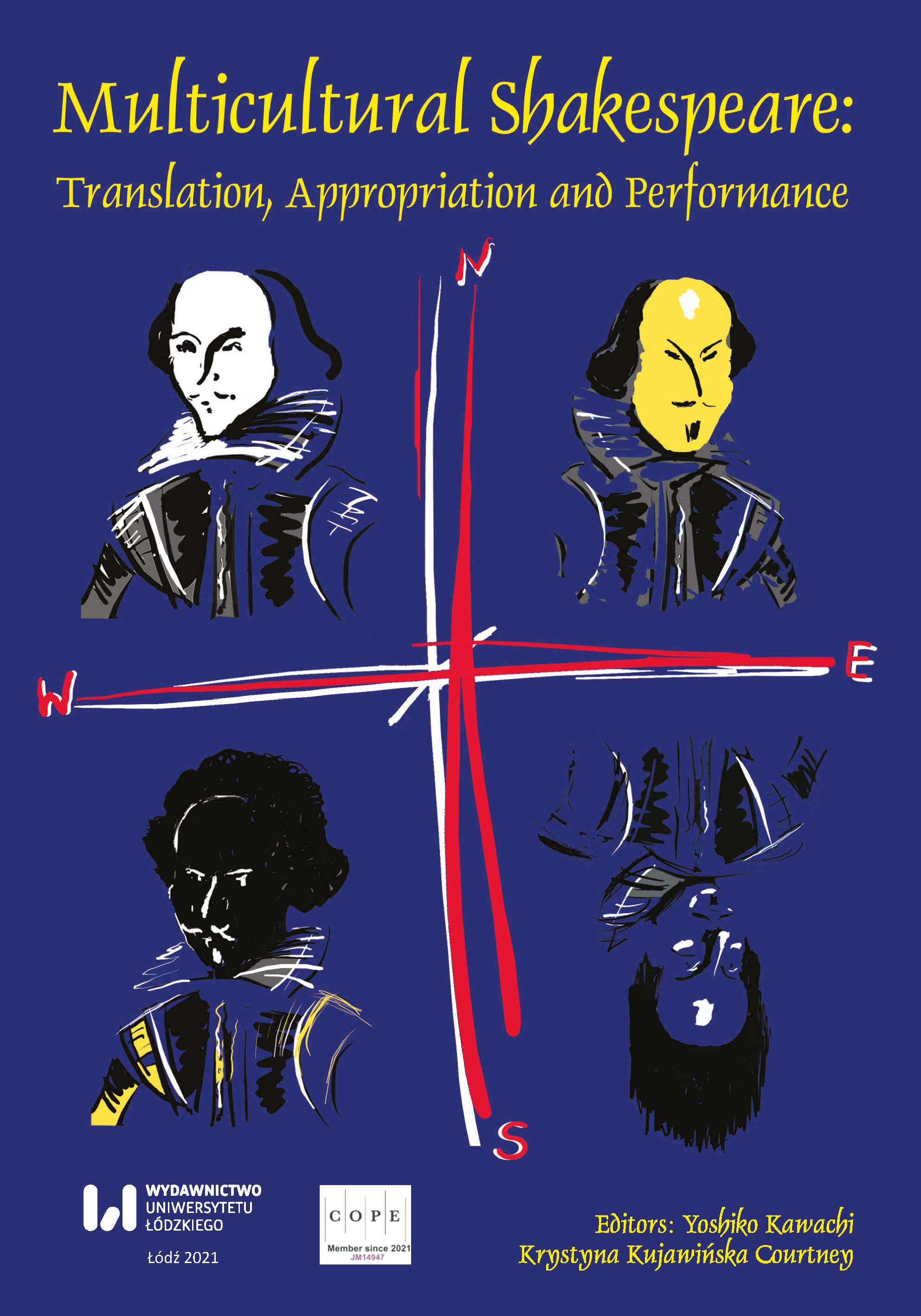The Domestication and Arabization of the Bard: Towards the Reception of Shakespeare in the Arab World
DOI:
https://doi.org/10.18778/2083-8530.23.03Keywords:
adaptation, Arabic, Arabization, cultural transfer, Khazal al-Majidi, repositioning, Shakespeare, translationAbstract
Since Najib al-Haddad and Tanyusʻ Abdu’s first Arabic versions of Romeo and Juliet and Hamlet at the end of the 19th century, the reception of Shakespeare in the Arab world has gone through a process of adaptation, Arabization, and translation proper. We consider the process of Arabization / domestication of Shakespeare’s plays since Najib al-Haddad’s adaptation of Romeo and Juliet and Tanyusʻ Abdu’s adaptation of Hamlet, to the achievements of Khalīl Mutran and Muhammad Hamdi. We underline, as particular examples of Shakespeare’s appropriation, the literary response of Ali Ahmed Bakathir, Muhammad al-Maghut and Mamduh Udwan, with a particular stress on Khazal al-Majidi and his adaptations of Shakespeare’s plays. All these writers reposition Shakespeare’s plays in an entirely different cultural space.
Downloads
References
al-Azzam, Bakri. Certain Terms Relating to Islamic Observances: Their Meanings with Reference to Three Translations of the Qur’an and a Translation of Hadith. Diss. Durham University, 2005. http://etheses.dur.ac.uk/1775/
Google Scholar
al-Janabi, Yousra. خزعل الماجدي يغوص في 'جحيم شكسبير' (khazaeal almajidiu yaghus fi 'jhim shaksabira' yasraa aljanabiu, Khazal Al Majidi dives into 'Shakespeare's Hell', MEO—Middle East Online, 21.03.2020. https://middle-east-online.com/خزعل-الماجدي-يغوص-في-جحيم-شكسبير.
Google Scholar
al-Juraydini, Sami. Riwayat Hamlet li-Shakespeare (The Play of Hamlet by Shakespeare). Cairo: al-Matba‘a al-Rahmaniyya, 1922.
Google Scholar
al-Majidi, Khazal. الأعمال المسرحية (Al’aemal almasrahiatu, Theatrical Works) Vol. 1. Beirut: almuasasat alearabiat lildirasat wa alnushri, 2011.
Google Scholar
al-Majidi, Khazal. جحيم شكسبير (خمس مسرحيات تعيدإنتاج مسرح و سيرة شكسبير) (jahim shaksubir: khms musrahayat teid'iintaj masrah w sirat shuksbir, Shakespeare’s Inferno: five plays reproducing plays and Shakespeare’s biography). Amann: Dar-Fadaat, 2018.
Google Scholar
Al-Shetawi, Mahmoud F. “Arabic Adaptations of Shakespeare and Postcolonial Theory.” Critical Survey 25.3 (2013): 4-28. JSTOR, http://www.jstor.org/stable/24712406
Google Scholar
DOI: https://doi.org/10.3167/cs.2013.250302
Al-Shetawi, Mahmoud F. “Hamlet in Arabic.” Hamlet Studies 22.1-2 (2000): 77-109.
Google Scholar
Dickins, James, Sandor Hervey and Ian Higgins. Thinking Arabic Translation. London and New York: Routledge, 2002.
Google Scholar
Hanna, Sameh F. “Decomercializing Shakespeare: Mutran’s translation of Othello”. In Shakespeare and the Arab World. Eds. Katherine Hennesey and Margaret Litvin. New York and Oxford: Berghahn, 2019. 35-62.
Google Scholar
DOI: https://doi.org/10.2307/j.ctv1850hj6.6
Hatim, Basil and Ian Mason. Discourse and the Translator. London: Longman, 1990.
Google Scholar
Hawamdeh, Mufid. “Allusions to Muhammad in Shakespeare: a Lexico-Cultural Study”, Damascus University Journal 13 (1988): 53-72.
Google Scholar
Hawamdeh, Mufid. “Shakespeare’s Treatment of the Moor in Othello: an Oriental Perspective”, International Journal of Islamic and Arabic Studies IV.1 (1987).
Google Scholar
Haywood, John Alfred. Modern Arabic Literature (1800-1970): An Introduction, with Extracts in Translation. London: Lund Humphries, 1971.
Google Scholar
Hutcheon, Linda. A Theory of Adaptation. London: Routledge, 2013.
Google Scholar
DOI: https://doi.org/10.4324/9780203095010
‘Iffat, Muhammad. Riwayat Makbith (The Play of Macbeth). Cairo: Matba‘at al-Muqattam, 1911.
Google Scholar
Khulūsi, Safā’. “a1-‘Anāsir a1-‘Arabiyyah fi Adab Shaykisbir” (“The Arabic Elements in Shakespeare’s Literature”). Ahl al-Naft, no. 59, June 1956.
Google Scholar
Litvin, Margaret. Hamlet’s Arab Journey: Shakespeare’s Prince and Nasser’s Ghost. Princeton and Oxford: Princeton University Press, 2011.
Google Scholar
DOI: https://doi.org/10.23943/princeton/9780691137803.001.0001
Najm, Muhammad Yusif. Al-Masrahiyya fi al-Adab al-‘Arabi al-Hadith: 1847-1914 (The Play in Modern Arabic Literature: 1847-1914). Beirut: Dar Beirut lil-Tiba‘a wa al-Nashr, 1956.
Google Scholar
Next Page Foundation. 2004. “Lost and Found in Translation. Translations’ Support Policies in the Arab World”. A study commissioned by the Next Page Foundation, conducted in 2004 by Thalassa Consulting and Gregor Meiering.
Google Scholar
Scoville, Spencer Dan. The Agency of the Translator: Khalil Baydas’ Literary Translations. Diss. University of Michigan, 2012.
Google Scholar
Downloads
Published
How to Cite
Issue
Section
License

This work is licensed under a Creative Commons Attribution-NonCommercial-NoDerivatives 4.0 International License.












